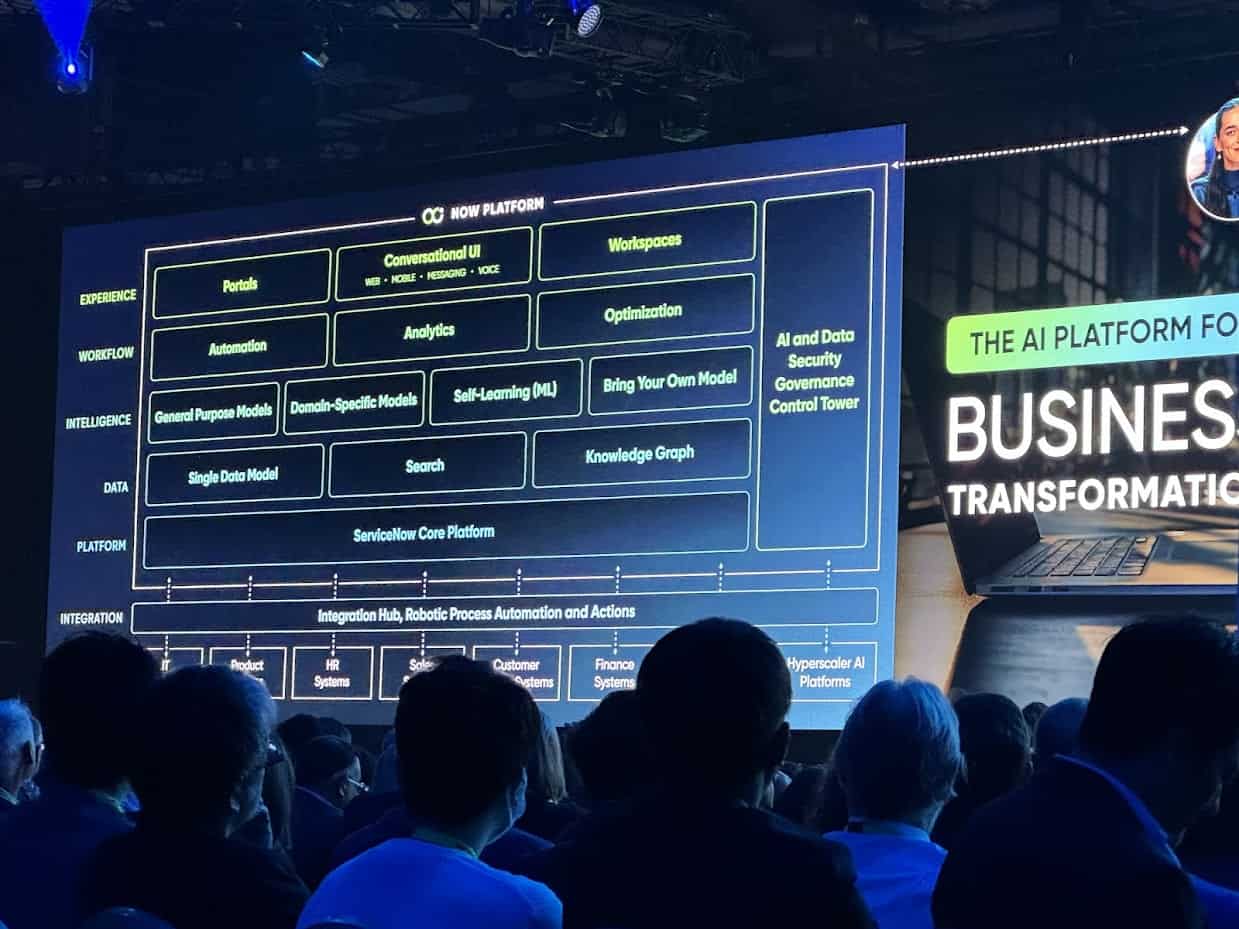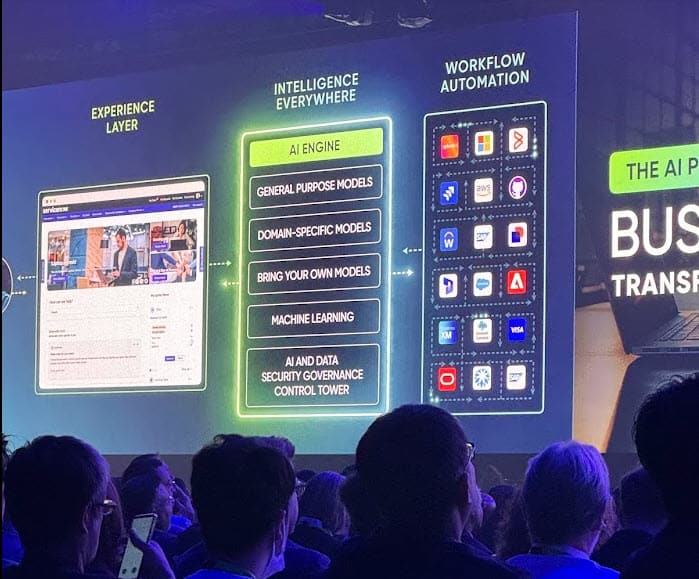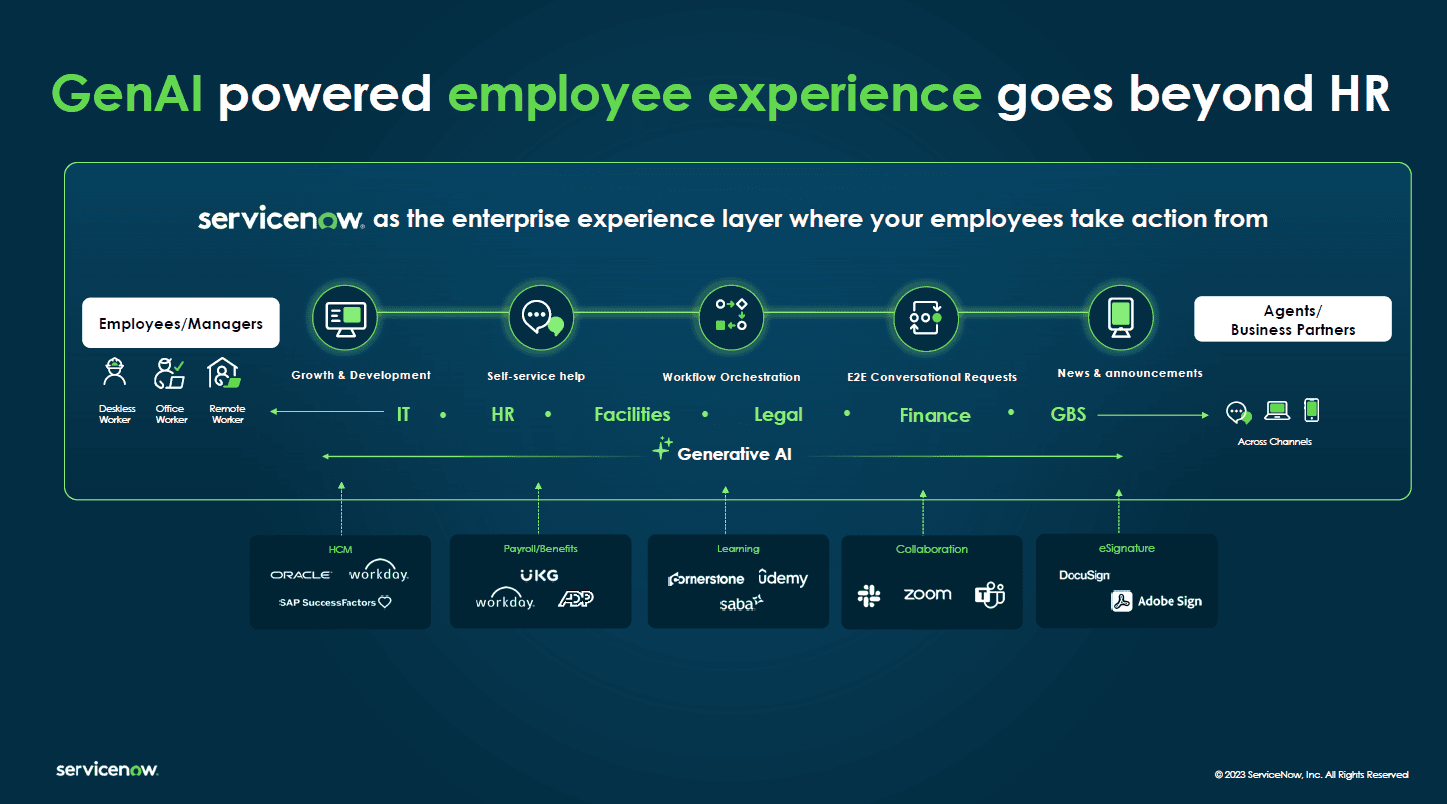Will AI Finally Connect The Enterprise? Just Ask ServiceNow, They Say Yes.
This week, ServiceNow held their annual user conference with more than 22,000 IT and technology professionals, and they announced some significant enhancements to their strategy. ServiceNow’s goal is to integrate the enterprise with a new layer of workflow software that can connect anything to anything, and then give employees, customers, and leaders access to information and systems in a single pane of glass.
Historically, ServiceNow did this through a series of case management and service delivery tools used primarily by IT departments. And that platform was very successful in helping IT service teams automate and streamline all of the various IT requests and IT problems that they face. But as the company grew and became more ambitious, and now that Bill McDermott is leading the company, who is one of the greatest leaders I’ve ever met, they are moving greatly beyond that.
In the employee area there are a wide range of ambitious products coming. First, the employee workflow offering, which used to be called HR, now includes workplace management, onboarding, surveys, and tools for skills analysis, a talent intelligence platform they acquired from Hitch, internal mobility and job placement, and recruiting. The company is building workflows for recruiting, specifically to help organizations streamline the massively complex issue of scheduling interviews, managing candidate flow, and negotiating the relationship between internal candidates and external candidates. And that space, which sounds a little bit nichey, is actually becoming bigger by the minute, because companies are so focused on internal mobility and job dynamics inside of the company.
But when I attended the conference this week, it changed, and the story evolved significantly. Bill McDermott spent almost an hour telling us the same story he had been telling before, but this time, instead of talking about workflows, he talked about AI. He essentially replaced the workflow engine story, which he calls a platform of platforms, with “The AI Platform for Business Transformation.” (Note it’s not about “digital transformation” any more.)
 |
And what they are saying, and it’s a really good message, is that AI is going to be an enterprise transformation technology, just like digital.
Only a few months ago we were talking about digital transformation. Well that’s old news: now we’re going to transform with AI. Yes, every technology is a business transformation tool in a sense, but I think he’s right: The level of transformation that’s going to take place with AI is an order of magnitude greater than what took place with the internet itself. And I can explain more below.
ServiceNow draws the picture as a collection of heterogeneous systems integrated together with an AI engine in the middle. And the example they gave in the keynote was an example of a bakery where they’re making various baked goods in different factories and different ovens and customers are coming into stores, purchasing different products, and the weather changes. Because of the change in weather there is more demand for one type of baked good than another, so the company runs out of supply.
 |
The AI system in the middle, supposedly powered by ServiceNow, picks up this data, senses the change, uses AI to predict what to do, and orders the manufacturing plants to change the mix of what to bake. Customers get the new supply, and revenue goes up. That is obviously a very compelling story.
 |
By the way, I kind of think SAP told the same story in the 1980s when they sold integrated supply chain management, and I believe Qualtrics sold the same story when they sold customer experience management. So the funny thing about it is all of these technology vendors are chasing after the same problem in different ways. And Bill McDermott, who’s been around through all of this, is savvy enough to apply the same story to ServiceNow. That’s why I think he is such a brilliant CEO and such a brilliant communicator, by the way.
So is this really the future of AI? Will AI be the orchestration system under our legacy platforms that ties them together and gives us solutions?
There’s no question in my mind that this is going to happen. It’s not going to happen overnight, but it will. And this will also true in our consumer life too.
This mess of “stuff” we deal with is essentially the problem we face in productivity. The reason we are unproductive in a given day is because we become unfocused on what we’re trying to do as we search for information, play with a spreadsheet, search for a PowerPoint slide, sell a customer the wrong thing because we’re out of stock, or try to figure out why some equipment isn’t working. (Ever listen to the keyboard clicking going on behind the scenes when you call your cable company?)
Every role I have ever experienced in business, and I’ve been around for a long time, has to do with somebody trying to do aspiring work and finding themselves stymied because they can’t find the tools or the information they need. If you could ask AI to tell you the answer to a question and it could reach out into your enterprise systems and find it, your life would be much better. (Just like I keep trying to get Siri to tell me things that it doesn’t know.)
And as I discuss in this week’s podcast, it’s easier to ask a question verbally or with a text than it is to search around in Workday or Oracle or SAP or any other system, including HubSpot, Salesforce, etc. The decades of work we have done to make systems easier to use is going to be changed because of the generative AI opportunities we have in front of it.
Now, why is ServiceNow so well positioned for this? Two real reasons.
First, they’ve been building workflow tools for a long time. A lot of their systems are designed for what is called citizen developers (that means you and me), building things that are easy for us to use ourselves. So there are lots and lots of IT developers using ServiceNow. (I can attest to that because I saw them at this giant conference this week.)
But the second reason is they know what these backend systems do. ServiceNow engineering and product teams are very familiar with what SAP, Oracle, Workday, and the actual workflows and transactions these systems try to automate.
I sat down with the HR product team, who I know fairly well, and they showed me how they’re mapping employee transactions into the ServiceNow platform so that they can build generative AI solutions to reach out and transact with systems in your company. It’s going to take time and it won’t be perfect, but they’re well along on the path. And it begs the question of whether all of our enterprise systems become consolidated under this new pane of glass.
 |
Now, there are two possible downsides to this architecture.
First, it is expensive. You’re now buying another complex enterprise platform on top of your existing complex enterprise platforms. Oracle, SAP, Workday, Salesforce, Hubspot, and others are trying to do this for you. Salesforce wants to be your single customer platform. Workday wants to be your single financial and HR platform. SAP wants to be your supply chain and manufacturing system. You’re paying a lot of money for them to build this and now you’re paying an equivalent amount of money for ServiceNow to do it as well. ServiceNow’s products are expensive and you can see that from their revenue.
But the second problem is a little trickier (and I don’t think I completely understand yet). You’ve now created another fragile system. The ServiceNow workflows themselves are actually going to become legacy because you’ve embedded business rules into this system, and you have to manage a bunch of mini applications sitting on top of your other applications. And when the other applications change or get upgraded or replaced (a lot of software companies get acquired and then their product lines change) you as a customer have to go back and figure out what you did in ServiceNow to re-engineer it.
This does remind me a little bit of my old days at IBM when I worked in the mainframe world. In the mainframe world all of our applications were custom developed and we had large teams of COBOL programmers building these systems. I used to work with data processing departments and talk to them about how they were integrating all these systems together within their own companies. Well, you’re going to be building that equivalent tool of people in the ServiceNow infrastructure.
Now, if I was sitting in front of Bill McDermott, I’m sure what he would say to me is, “This is a much more cost-effective way to run your company, and we, ServiceNow, are going to automate that all for you with AI.” And I do believe that will happen over time. But it is a question to consider how much of your organizational experience and functionality do you want to put into ServiceNow versus another core system.
Every time we want to build functionality we have to make an investment decision as to where to put it. Should we put our new career management platform in Workday? Should we put it in Eightfold? Should we put it in Degreed? Should we put it in Cornerstone? Whatever decision you make locks you into that vendor. and that vendor’s roadmap.
Given that ServiceNow is such a successful company, a lot of companies are saying, “now that we’ve paid for it, let’s just do it.”
Will Generative AI be able to live up to this promise? Will it tell you to bake more bagels in advance when the weather gets warm?
I would say, because of our experience AI through Galileo®, the answer is yes.
This technology is as important as the invention of electricity. I know that sounds hyperbolic and a little bit over the top, but I’m serious. I’ve never seen a technology that’s so self-developing, powerful, and fast-moving. And we are in the first or second year of generative AI hitting the market.
It is quite likely that gen AI will be improving these connections, developing code, and optimizing these end-to-end, “one pane of glass systems” on our behalf within a few years. Google is working on this in the consumer side. Microsoft is working on this in the world of office productivity. It would not be surprising at all if ServiceNow becomes one of the masters of doing this in the enterprise.
Stay tuned for more. I’ll try to keep you up to date.
Additional Information
Enterprise Talent Intelligence Has Arrived: Disrupting The HR Tech Market
ServiceNow Boldly Introduces AI Solution For Skills, Learning, And Growth
Why I’m Still Bullish On Workday
Here Come The Copilots: Microsoft’s GenAI Strategy For The Enterprise
AI in HR: Certificate Course in The Josh Bersin Academy (join the more than 30,000 people who love it!)
